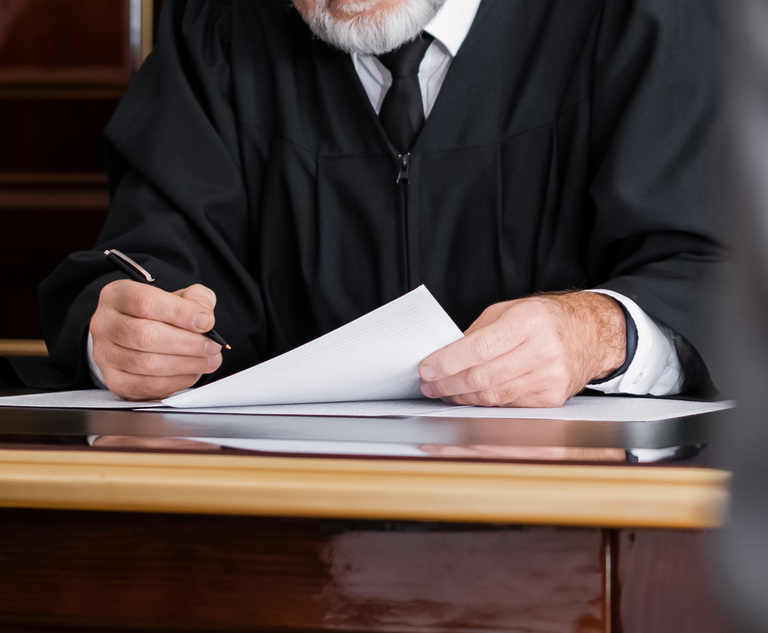Committee On Judicial Ethics

February 01, 2024 | New York Law Journal
Judicial Ethics Opinion 23-54(1) A judge's impartiality cannot reasonably be questioned based on (a) de minimis political contributions made more than two years ago or (b) the business and/or political activities of the judge's first-degree relative, where the relative has no direct or indirect involvement in the proceeding and no interests that could be substantially affected by the proceeding.
By Committee on Judicial Ethics
6 minute read

January 31, 2024 | New York Law Journal
Judicial Ethics Opinion 23-53A full-time quasi-judicial official may not join a government advisory council that seeks to implement comprehensive domestic violence services to survivors who need assistance addressing child support, unless the council's membership includes representation from all participants in the adjudicative process.
By Committee on Judicial Ethics
7 minute read

January 30, 2024 | New York Law Journal
Judicial Ethics Opinion 23-52May a full-time judge ethically purchase and renovate a building at the judge's sole personal expense, and donate it to a not-for-profit religious organization for which the judge is also the head minister?
By Committee on Judicial Ethics
2 minute read

January 29, 2024 | New York Law Journal
Judicial Ethics Opinion 23-51A full-time judge may not request a fee waiver to enroll in online diversion courses that the prosecution seeks to require as a condition of a negotiated plea agreement.
By Committee on Judicial Ethics
3 minute read

January 28, 2024 | New York Law Journal
Judicial Ethics Opinion 23-50When a judge has reported an attorney to a disciplinary authority, is the judge disqualified from presiding over matters involving the attorney and/or the attorney's law partner?
By Committee on Judicial Ethics
2 minute read

January 15, 2024 | New York Law Journal
Judicial Ethics Opinion 23-49A judge may wear judicial robes when giving the keynote address at a public high school graduation.
By Committee on Judicial Ethics
3 minute read

January 14, 2024 | New York Law Journal
Judicial Ethics Opinion 23-48(1) A judge who formerly served as the town attorney is not disqualified from presiding in matters handled by a lawyer who previously served on the town board during the judge's tenure as town attorney, even if the lawyer plans to, or does, call the judge as a witness and/or seek the judge's emails and records concerning events that took place during that period. Rather, the judge may preside as long as the judge concludes they can be fair and impartial. (2) Where the lawyer also claims the existence of "extreme animosity" between them and the judge, recusal is not warranted where the judge has conducted the relevant interpersonal analysis and has determined that the judge can be fair and impartial.
By Committee on Judicial Ethics
6 minute read

January 11, 2024 | New York Law Journal
Judicial Ethics Opinion 23-47A town justice may accept an invitation from the town board to attend a town board meeting and address questions "for public information" concerning the court's procedures and limitations with respect to the collection of fees and court security, to help explain and clarify the court's role in these matters. The judge may not comment on any pending or impending cases and should be careful not to cast doubt on their integrity, impartiality, and independence in adjudicating matters that could result in revenue for the town.
By Committee on Judicial Ethics
5 minute read

January 10, 2024 | New York Law Journal
Judicial Ethics Opinion 23-46Where a judge's spouse is the Corporation Counsel and thus the head of the agency and/or attorney of record for the office: (1) In general, the judge must disqualify from any case involving the Corporation Counsel's office. However, this disqualification may be subject to remittal after full disclosure on the record, provided the judge's spouse remains permanently absent from the courtroom.
By Committee on Judicial Ethics
5 minute read

January 09, 2024 | New York Law Journal
Judicial Ethics Opinion 23-45Where a judge was represented by private counsel in a hybrid Article 78 proceeding that has since concluded, must the judge continue to disclose or disqualify in matters involving the judge's private attorneys and/or other members of their law firm?
By Committee on Judicial Ethics
2 minute read
Trending Stories
- 1How Law Schools Fared on California's July 2024 Bar Exam
- 2'Discordant Dots': Why Phila. Zantac Judge Rejected Bid for His Recusal
- 3Here's What Corporate Litigators Expect Del. Courts to Address in 2025
- 4U.S. Supreme Court Has No Jurisdiction Over Trump's New York Criminal Case: Prosecutors
- 5The Law Firm Disrupted: With KPMG's Proposed Entry, Arizona's Liberalized Legal Market is Getting Interesting
More from ALM
- Scan In Progress: Litigators Leverage AI to Screen Prospective Jurors 1 minute read
- Legal Speak at General Counsel Conference East 2024: Match Group's Katie Dugan & Herrick's Carol Goodman 1 minute read
- Legal Speak at General Counsel Conference East 2024: Eric Wall, Executive VP, Syllo 1 minute read



